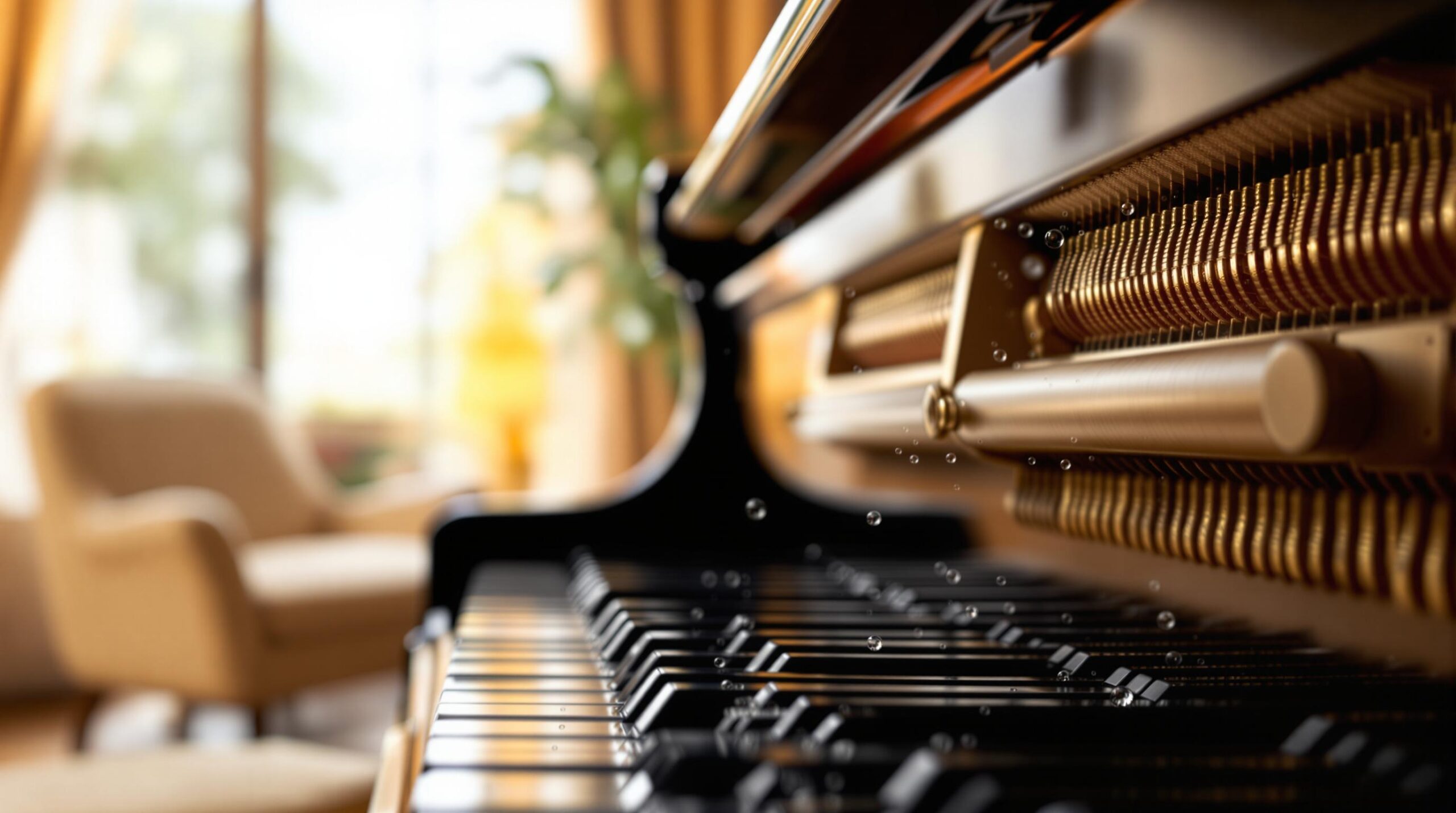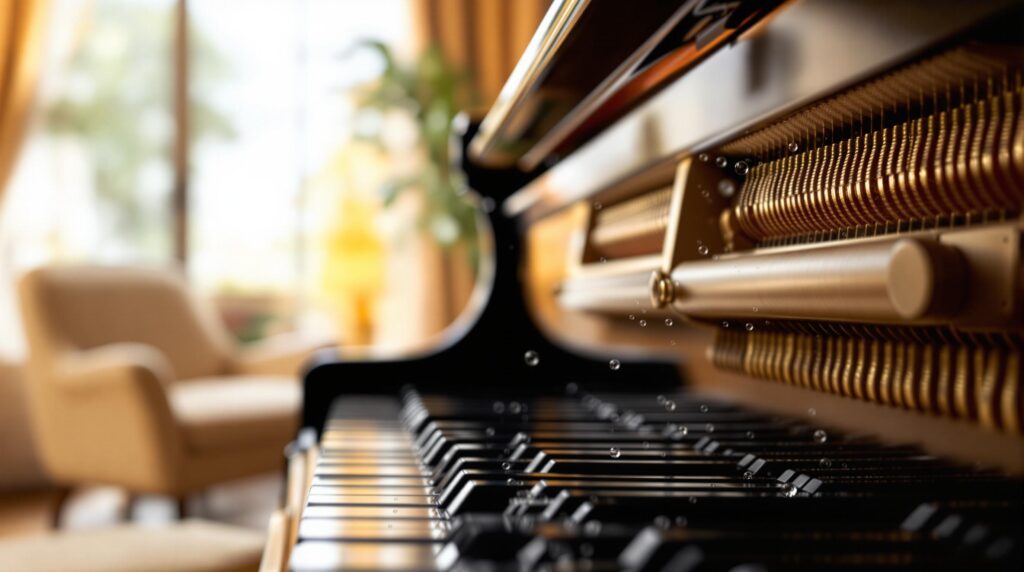
Humidity can make or break your piano’s performance. Here’s why:
- High Humidity: Swells wooden parts, causing sticky keys, slower response, and dull sound.
- Low Humidity: Shrinks wood, leading to loose joints, cracks, and uneven key resistance.
- Seasonal Changes: Fluctuations weaken mechanical joints over time.
Key Signs of Humidity Problems:
- Sluggish or sticky keys
- Uneven key resistance
- Delayed hammer movement
How to Protect Your Piano:
- Maintain 40–50% relative humidity using humidifiers, dehumidifiers, or piano-specific systems.
- Avoid placing the piano near heat vents, windows, or direct sunlight.
- Use a digital hygrometer to monitor humidity levels daily.
- Schedule regular professional maintenance to ensure smooth performance.
Humidity control is essential to keep your piano in tune, responsive, and long-lasting. Read on for detailed tips and solutions.
Humidity Control for Your Piano
Piano Action Mechanics Basics
The piano action mechanism is a system of levers, springs, and dampening parts that transforms the pressure of your fingers on the keys into hammer movement. However, this intricate system is sensitive to changes in humidity.
Main Action Parts
A piano’s action relies on several precision components working together to create its touch and sound. Key elements include:
- Wooden Parts: Key lever, whippen assembly, and hammer shank
- Felt Components: Hammer heads, dampers, and key bushings
- Metal Parts: Springs, flanges, and capstans
- Leather Pieces: Backchecks and hammer catch mechanisms
Each part plays a role, and even a tiny misalignment can throw off the piano’s performance.
Action Precision Requirements
The action’s setup is critical for smooth playability and sound quality. Proper calibration affects key touch, dynamic control, and note repetition. But humidity can disrupt this balance. For instance, when wood swells in high humidity, it can change the spacing between the hammer and string, messing with escapement timing.
Given these tight tolerances, piano technicians use specialized tools to align every part with precision. Regular maintenance becomes especially important in areas where humidity levels fluctuate. Now, let’s dive into how humidity impacts these delicate mechanics.
How Humidity Damages Piano Actions
Piano actions are sensitive to changes in humidity because they rely on materials like wood, felt, and metal. Each reacts differently to moisture levels, which can disrupt the instrument’s performance.
Issues Caused by High Humidity
When humidity rises, wooden parts absorb moisture and swell, leading to:
- Sticky Keys: Swollen wood creates more friction, making keys stick.
- Slower Response: Extra resistance in the action delays hammer movement.
- Dull Sound: Felt components may change, affecting how hammers strike strings and reducing sound clarity.
Issues Caused by Low Humidity
In dry conditions, wooden parts lose moisture and shrink. This can loosen joints over time, reducing the action’s precision and responsiveness.
Impact of Seasonal Changes
Fluctuating humidity from seasonal shifts puts strain on mechanical joints. Over time, this weakens the action, making it harder to maintain consistent performance.
sbb-itb-b8bc1ab
Signs of Humidity Problems
Humidity can cause noticeable damage to a piano’s action. Spotting the warning signs early can help you avoid expensive repairs down the road.
Common Warning Signs
Watch out for these symptoms that may point to humidity issues affecting your piano’s action:
- Sluggish Key Response: Keys feel heavy and slow to bounce back.
- Uneven Key Resistance: Some keys feel harder or softer to press than others.
- Sticky Keys: Keys that don’t return to their original position smoothly.
If you observe these problems, it’s time to check how the action is performing.
Testing Action Response
Here are a few simple ways to check for humidity-related problems:
- Key Return Test: Slowly press each key and see if it rebounds smoothly. Look for consistency across the entire keyboard.
- Repetition Check: Play each key multiple times at different speeds. The response should remain steady and predictable.
- Visual Inspection: While playing, watch the action for unusual movements, delayed spring returns, or signs of swollen wood.
If any of these tests reveal issues, it’s best to consult a professional technician for a thorough evaluation.
Humidity Control Methods
Managing the right humidity levels is essential for protecting your piano and keeping it in top condition.
Best Humidity Levels
Pianos thrive when the relative humidity stays between 40% and 50%. This range helps prevent issues like wood swelling, metal rusting, and damage to sensitive parts.
Room Climate Control
Using home climate control systems can help maintain the right humidity levels for your piano:
- Whole-house humidifiers: These connect to your furnace to add moisture during dry seasons.
- Portable dehumidifiers: These are great for lowering humidity in rooms that tend to be damp.
- HVAC systems with humidity control: These systems help keep moisture levels steady year-round.
Make sure to place your piano away from heat vents, direct sunlight, exterior walls, and windows to avoid sudden temperature and humidity changes.
Piano Humidity Systems
For more precise control, consider a specialized piano humidity system that combines both humidification and dehumidification. For installation or advice, you can reach out to Cooper Piano.
These methods, paired with regular maintenance, will help your piano stay in excellent playing condition for years to come.
Action Maintenance Steps
Keeping your piano’s mechanics in good shape involves a mix of professional care and regular at-home checks, especially to manage the effects of humidity.
Professional Service Schedule
Piano technicians suggest regular:
- Tuning to keep the sound and mechanics in sync
- Action regulation to preserve proper mechanical alignment
- Cleaning of action components to remove dust and debris
The frequency of these services depends on your piano and environment. A technician can help create a maintenance plan tailored to your needs. Pair this with consistent monitoring at home.
Home Monitoring Methods
Take simple steps at home to keep your piano in check:
- Use a digital hygrometer to track humidity levels.
- Keep a log of humidity readings and how the keys respond.
- Check wooden components for signs of swelling or sticking.
- Play softly to test the key response for any irregularities.
If you notice issues that you can’t address yourself, it’s time to call in a professional.
Cooper Piano Services
For expert care, Cooper Piano offers certified technicians with over a century of experience in the industry. They’ll work with you to create a maintenance plan that keeps your piano responsive and performing well throughout the year.
Summary
Managing humidity effectively plays a key role in keeping your piano’s mechanics in great shape and extending its lifespan. Stable, moderate humidity levels help avoid mechanical problems and ensure smooth performance.
Here are some practical steps for humidity management:
- Use a digital hygrometer to monitor humidity levels daily.
- Address any humidity fluctuations quickly to prevent damage.
- Schedule regular professional maintenance to check for potential issues.
Signs of humidity problems include sluggish or uneven key responses. If these persist, it’s time to consult a qualified technician.
Investing in proper climate control and routine care is essential to maintain your piano’s action and performance.

